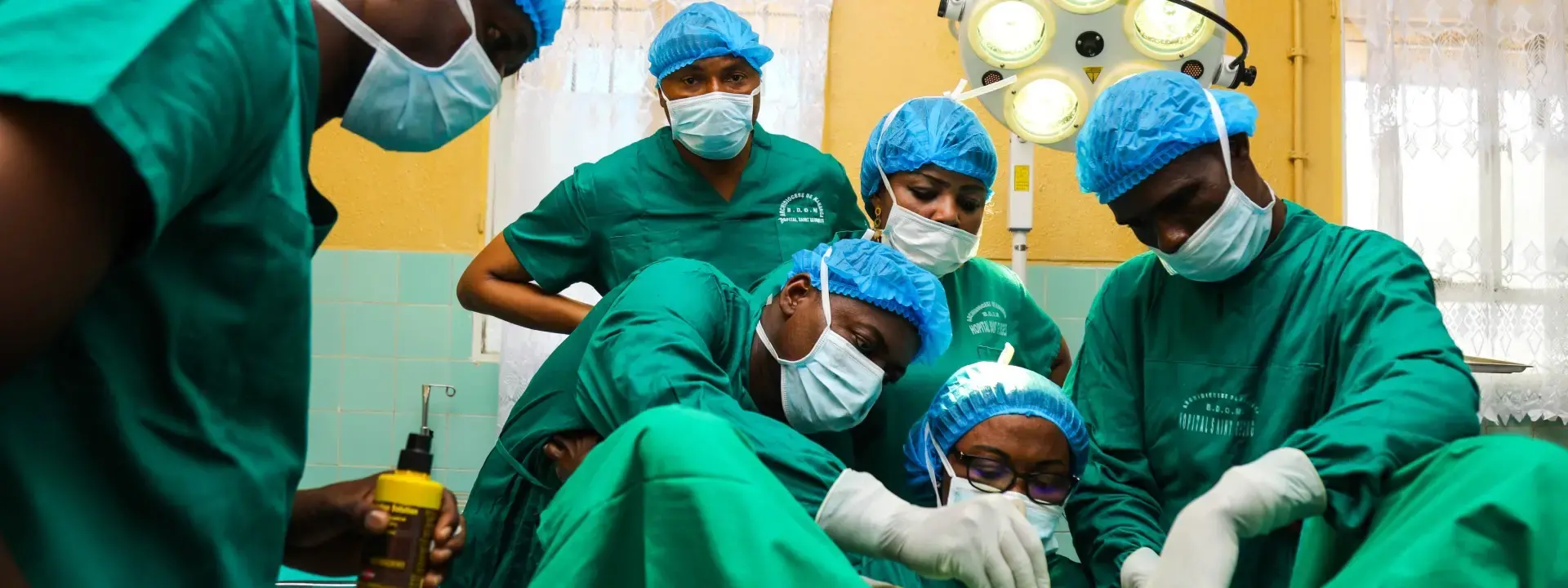In 2003, the United Nations Population Fund (UNFPA) and its partners launched the global campaign to eliminate fistula, which affects many women and girls around the world. The DRC has been involved in this campaign to eliminate fistula since 2005. A survey conducted in 2006, in support of the National Reproductive Health Program, showed the existence of fistulas predominantly of obstetric origin (69.3%), with a low percentage of fistulas following sexual violence (16%). According to the 2007 Demographic and Health Survey (DHS), the number of women with fistula is estimated at more than 42,000 cases that are not treated. The incidence of fistula remains unknown, but access to emergency obstetric care services is very difficult; the incidence could therefore be as high as two per thousand births. Since 2006, the country has benefited from fistula surgical repair activities carried out in the various provinces with the support of UNFPA and international and national NGOs. Gynecologists and obstetricians, urologists and other specialists in the field had provided appropriate care to several tens of thousands of identified women during fifteen repair campaigns. This support included training providers (surgeons, nurses, social workers, community relays), the supply of materials and medicines and also subsidizing care and the socio-economic reintegration of some women cured of fistula. Some health facilities, such as Saint Joseph Hospital in Kinshasa and Panzi General Hospital in Bukavu, have integrated free fistula repair into their routine surgical program. A national strategy to combat urogenital fistula in the DRC was developed in 2006 for a period of 3 years; strategy based essentially on external financing, implemented with mixed results.
Priority areas
- Prevention of Obstetric Fistula and Strengthening Access to SONU Services
While surgery is reducing the number of fistula cases, it is imperative to accelerate the implementation of preventive measures to reduce the occurrence and recurrence of this disability. Primary prevention will focus on issues related to socio-cultural factors (nutrition, home births, etc.), gender equality, girls' education, early marriage, laws and policies that hinder the use of reproductive health services. In addition, it is necessary to ensure that pregnancies are wanted and planned, and to ensure the availability and accessibility of quality maternal health services, including family planning, skilled delivery, and emergency obstetric and neonatal care. For every pregnant woman, it is necessary to ensure that she, her family members, and communities have information on prenatal monitoring services and danger signs during pregnancy, including prolonged labor. Particular emphasis will be placed on addressing the "3 delays," which are: delay in the decision to seek care due to community or sociocultural factors, due to ignorance of the need for care or early signs of complications; delay in accessing a health center, possibly due to transportation, distance, or cost issues; delay in receiving adequate care at the health center, because resources (personnel, equipment, etc.) may not be available, or because the care provided is inadequate, or even the very cause of complications.
To reduce the risk of obstetric fistula, it is also imperative to improve the health of women by addressing the "4 delays": too early, too close together, too numerous, and too late maternity. Regarding secondary and tertiary prevention at the level of health facilities, all midwives and other health providers working in maternity wards must be trained to properly carry out refocused Prenatal Consultations (CPN), the regular and correct use of the partograph, the recognition of risk factors for the occurrence of obstetric fistula in pregnant women and other complications, offer emergency obstetric and neonatal care (SONU) or transfer as appropriate. Women who have had prolonged labor and are at risk of fistula should benefit from a urinary catheter. All these efforts can reduce the occurrence of new cases of fistula.
- Strengthening the Health System's Capacities for Quality Medical and Surgical Care of Women with Obstetric Fistula
The care of women with OF must be integrated into the activities of the HGRs, which will strengthen preventive measures at these FOSA levels. The thorny problem of patient transportation and their social care during treatment should encourage the decentralization of repair sites. To provide quality care to these women, the technical platform of these HGRs must be improved and the inputs made available. The management of incurable cases must be done with the communities to reduce the stigma and marginalization of victims. The creation of a National Tertiary-Level Reference PEC Center is important for very complex cases and can be used for training repair teams.
- Strengthening the Socio-Economic and Educational Reintegration of Girls and Women with Obstetric Fistula
Not all women with obstetric fistula need to be reintegrated, but reintegration activities must be properly conducted for those who will benefit, taking into account the realities of each environment. For these activities to be successful and sustainable, families and communities of origin must be involved and contribute.
- Strengthening Human Resources
The distribution of competent human resources in health is uneven in the different provinces, hence the urgent need to train a critical mass of providers capable of offering emergency obstetric and neonatal care for the prevention of OF but also competent teams (surgeons, anesthetists, nurses, midwives, physiotherapists, social workers, etc.) for adequate care of women with obstetric fistula.


